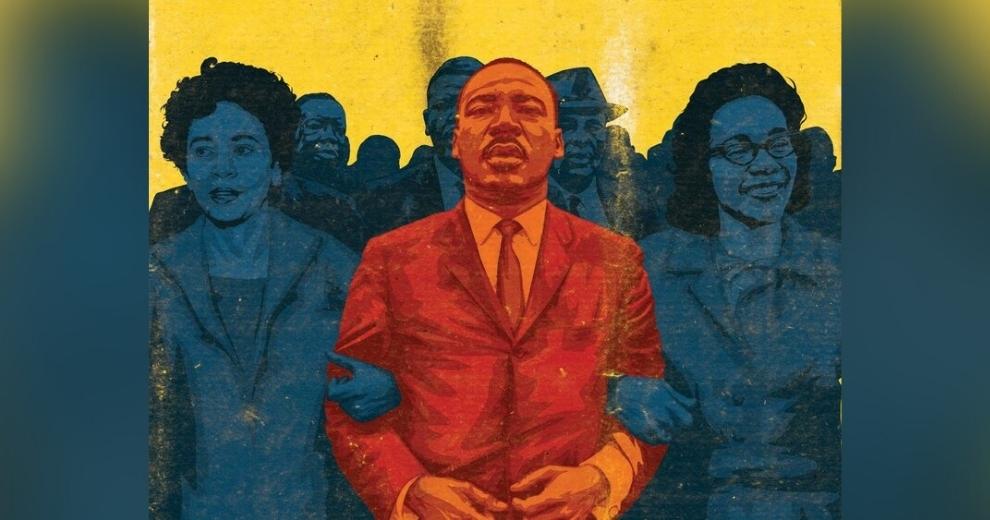This year Mary Baldwin University will honor the life and legacy of Martin Luther King Jr. by offering a series of virtual workshops on Jan. 17 to promote greater Unity in the Community. They will be led by clinical psychologist, activist, and founder of the Racial Trauma Center, Dr. Broderick Sawyer. All are open to faculty, staff, students, and alumni.
“Dr. Sawyer is a renowned specialist in the areas of liberation psychology, oppressive stress, compassion, emotional intelligence, and mindfulness meditation,” said MBU Chief Diversity Officer Andrea Cornett-Scott. His teaching is informed by “experiences working with [social justice] activists in Louisville, Kentucky, extensive research on racial trauma, experiences with therapy clients, and a study of his own personal psychology.”

The workshops will explore the psychology of oppression and compassion, and help attendees gain greater perspective around racial issues, related traumas, and effective methods of protest.
“While Dr. King was not a psychologist, he left plenty of clues as to how we can heal ourselves and society by achieving a full understanding of oppression, compassion, and the effective resistance of power structures,” wrote Sawyer in a statement.
Below is a schedule for individual workshops and their descriptions. Registration is open until Jan. 13: students, faculty, and staff can check their email for the registration link. The event is sponsored by the Office of the Chief Diversity Officer, the Office of Inclusive Excellence, the Office of Student Engagement, Black Student Alliance, Minority Clubs United, and the Coalition for Racial and Social Justice.

I. Psychology of Oppression and Compassion
9:30 a.m. – 10:30 a.m.
Open to everyone.
Dr. Sawyer’s opening lecture will use the generational narrative of American slavery to explore the psychological roots of oppression. By highlighting the ways we are generationally socialized into subconscious racially-biased attitudes and behaviors, he will illustrate the workings of oppressive psychology in a broader sense (e.g., oppression based on class, gender, and so on).
The psychological framework will supply a foundation for helping us understand how to counter oppressive psychology within ourselves with its opposite: The psychology of compassion.
II. Healing Racial Stress in People of Color
10:30 a.m – 12 p.m.
Exclusively for people of color*
Here Dr. Sawyer will address the depth of psychological harm that racial trauma causes people from communities of color.
After clearly identifying the negative effects of racial trauma, he will outline psychological practices that participants can use to safeguard their mental health. Years of experience studying and treating racial trauma taught Dr. Sawyer that while people from communities of color cannot always stop racism from happening, they can reduce its psychological harm by engaging in scientifically-supported mental health practices.
NOTE: Due to the specific nature of its content, this workshop is ONLY open to people of color. This is not intended to promote feelings of exclusion, but to offer a unique and important educational opportunity.
III. Will the Real Allies Please Stand Up?
1:30 p.m. – 3:30 p.m.
For faculty: First 45 minutes
For students: Second 45 minutes
Dr. Sawyer addresses the role of innate privilege — like race, class, gender, and heteronormativity — in the fight for social change. We want our attempts to help others to be effective, and we want simple answers. But privilege is not so black and white.
In his time working with diverse groups of activists in Louisville, Kentucky, Dr. Sawyer found the role of privilege to be complex, intersectional, and highly contextual. With so much confusion surrounding what those with privilege “should” do to help others who are “not privileged,” he aims to reveal just how simple applying the psychology of compassion can be. A series of practical to-do’s will help bring the message home to attendees.
IV. Effective Protest: Mental Hygiene, Critical Thinking, and Radical Truth-Telling
3:45 p.m – 5:15 p.m.
Open to everyone
The series’s final workshop is inspired by Dr. King’s resistance against oppressive structures and will explore effective, sustainable methods of protest.
Throughout history, protest has often been used to give a voice to groups that have been unjustly silenced, fueling positive change for the creation of compassionate societies. While protest is certainly a driving force for social change, it also comes with complex, situation-specific challenges — challenges that protesters have faced throughout human history.
Dr. Sawyer will draw on both Dr. King’s philosophies and his own experiences providing mental health support to activists to unpack the psychology of sustainable protest. He will explore the importance of goal-focused demonstration and coalition-building, as well as the mental health challenges faced by protesters and healthy solutions.
“While Dr. King was not a psychologist, he left plenty of clues as to how we can heal ourselves and society by achieving a full understanding of oppression, compassion, and the effective resistance of power structures.”
Dr. Broderick Sawyer
THE OFFICE OF INCLUSIVE EXCELLENCE was founded in 1996 to aid and assist Mary Baldwin’s students of color — which now make up more than 50 percent of its on-campus undergraduate population. OIE taps their interests and strengths to develop programming that promotes cross-cultural sharing and exploration. The office also offers holistic student support: monitoring their progress, advising minority student organizations, promoting positive community relations, representing concerns, and more.
To learn more about the office’s many programs and offerings, CLICK HERE.